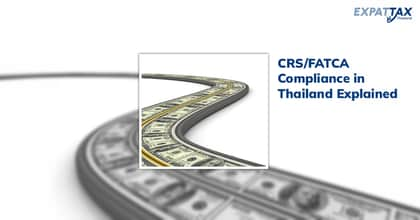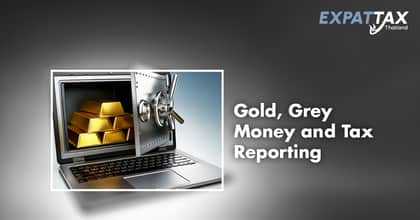Note: Although this tax incentive has been announced and approved by the Cabinet, detailed Royal Decrees or Revenue Department announcements confirming the specifics have not yet been released. It’s essential to verify all details once official documentation becomes available. Sign up for our tax alerts to get the latest news direct to your inbox.
Thailand has just announced what appears to be a generous five-year personal income tax exemption on profits from cryptocurrency sales. But before you rush to celebrate, it’s important to understand what’s actually been confirmed—and what still needs to be clarified.
This could be a welcome opportunity for expats living in Thailand, but as always with tax matters, the details matter. Here’s what we know so far.
A New Tax Exemption from 2025–2029
On 17 June 2025, Thailand’s Deputy Finance Minister announced a five-year exemption from personal income tax on capital gains from digital asset transactions. According to the announcement, this exemption will apply from 1 January 2025 to 31 December 2029.
But there’s a key condition: it only applies to transactions made through licensed digital asset platforms regulated by the Thai Securities and Exchange Commission (SEC).
If you’re trading through an unlicensed platform or a decentralised exchange, the exemption will not apply to you.
What We Know—and What’s Still Unclear
The policy has been confirmed through both the Ministry of Finance and government press releases. However, full implementation details have not yet been released.
At this stage:
- It appears the exemption will only apply to personal capital gains from crypto trading (i.e. buying and selling), and not necessarily to income from staking, mining, airdrops, or business activities.
- It is still unclear how gains will be reported, whether automatic reporting by platforms will be required, or what documentation taxpayers may need to provide.
- There may be implications for remittances—for example, if you cash out on a non-licensed platform and transfer money into Thailand, your income might still be taxed under existing rules.
Until further clarification is provided by the Thai Revenue Department, caution is advised.
Be kept up to date when more new breaks – sign up to our tax alerts here
Why Thailand is Doing This
This exemption is part of a broader strategy to boost Thailand’s digital economy and attract global investment.
According to government estimates, the move is expected to generate over 1 billion baht in indirect tax revenue, mainly from increased economic activity, VAT and growth in the crypto ecosystem.
The exemption builds on earlier policies, such as a VAT waiver on digital asset transfers between 2022 and 2023 and the approval of Thailand’s first spot Bitcoin ETF in 2024. Together, these moves signal Thailand’s intent to compete with countries like Singapore and the UAE as a digital asset hub.
What It Means for Expats in Thailand
If you’re an expat and a Thai tax resident (i.e. you spend more than 180 days in Thailand in a calendar year), this exemption could potentially reduce your tax liability on crypto gains—but only if you use the right platforms.
Here’s a quick breakdown:
✅ May be exempt
- Profits from trades on Thai SEC-licensed platforms
❌ Not exempt
- Profits from trades on decentralised exchanges or unlicensed international platforms
- Income from crypto-related business activities
- Gains remitted to Thailand from non-qualifying platforms (pending further clarification)
If you’re currently using platforms like Binance or other offshore exchanges, you may want to review your strategy for the remainder of 2025.
What You Should Do Next
While this announcement is promising, it’s not a green light to ignore compliance. Here’s what we recommend doing now:
- Check your platform: If you’re not using a SEC-licensed platform in Thailand, you may not qualify for the exemption.
- Keep good records: Document all trades, even those you think are exempt.
- Stay updated: Follow official guidance as it’s released over the next few weeks and months.
- Be cautious about remittances: If you transfer money into Thailand from offshore wallets or exchanges, normal remittance tax rules may still apply.
- Get expert advice: An early consultation can help you prepare and avoid pitfalls.
Sign up for our tax alerts to be kept informed
How We Can Help
At Expat Tax Thailand, we specialise in helping expats understand and manage their tax obligations, including the increasingly complex world of crypto.
We offer:
- Personalised guidance on crypto tax reporting in Thailand
- Advice on platform use and exemption eligibility
- Support with remittances and cross-border tax implications
This is a fast-moving area. We’re monitoring updates closely and will continue to share reliable, plain-English advice.
Final Thoughts
This five-year crypto tax break could be excellent news for expats—but it’s not automatic, and it’s not without limitations. You’ll need to use a licensed platform, maintain proper records, and be prepared for further clarification from the Thai Revenue Department.
Want to understand how this applies to you? Book a free consultation to discuss your crypto position and make a plan.


